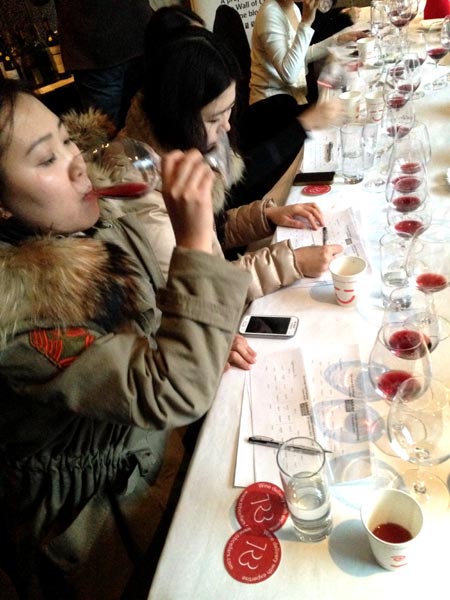A question of taste: What do Chinese want to drink?
 |
|
Chinese participants at the wine tasting, organized by Grape Wall of China blogger Jim Boyce in Beijing, sample a variety of Chinese wines. [Photo by Mike Peters / China Daily] |
Everyone wants to sell wine to China, says Grape Wall of China blogger Jim Boyce. "But they spend little effort to find out what Chinese people want."
So Boyce conducts a wine tasting in Beijing every year, offering a changing panel of Chinese consumers (and a couple of cabernet-swilling journalists, including myself) a chance to blind-taste about 20 low-priced wines available in the consumer market here.
This year he took the challenge up a notch. "Lots of hotels and restaurants have been asking me to recommend a good Chinese wine for their list," he says. So this year he mustered 21 bottles - all Chinese wines made from Chinese grapes. Then he gathered his tasters in a private room at Temple Restaurant Beijing, and let the swirling, sniffing, sipping and spitting begin.
The goals were simple: find the best ones, make people comfortable and have fun. Tasters simply scored each wine "love it", "like it", "dislike it" or "hate it".
The first 16 wines were all retail-priced at 150 yuan ($25) or less, Boyce says, though some are not easy to find. The last five were premium vintages he collected for comparison, which would cost between 199 yuan and 790 yuan per bottle.
Professor Ma Huiqin of China Agricultural University, who has taught wine appreciation for over a decade, chatted up the judges as we sampled two flights of white wines, two flights of reds and then the mixed flight of pricier wines.
"Part of the group prefers red over white," she says, "and feels reds are more complex and more enjoyable than white. Several people mentioned 'safe choices'. This means that consumers require predictability, even with the small wineries (which Boyce focused on - no Great Wall or Dragon Seal on the table). This is more challenging for small wineries than big ones. Fruitiness and complexity are preferred."






















